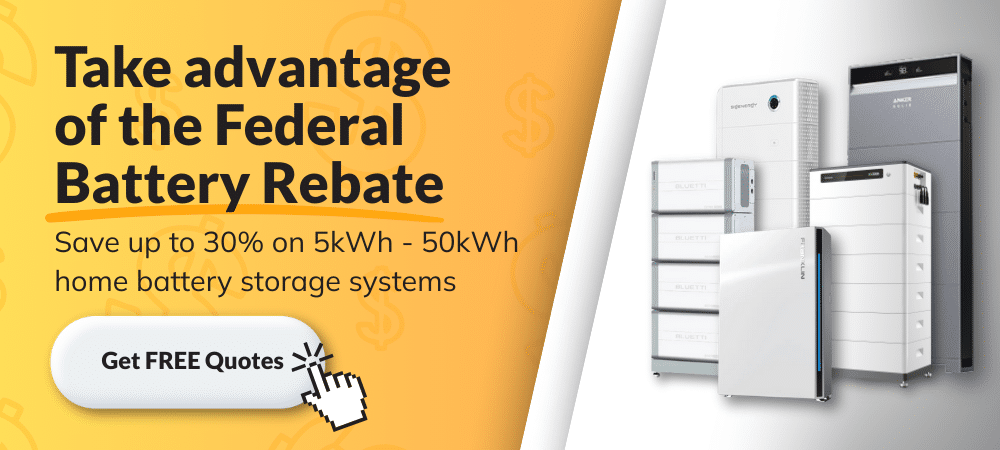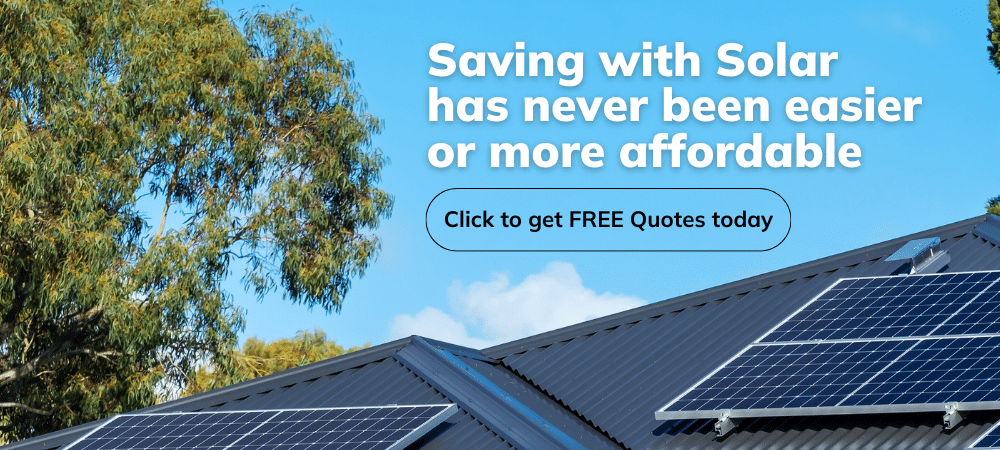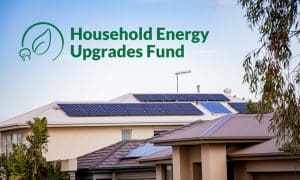Updated 10 June 2025
Australia boasts abundant sunshine, making solar power an attractive and environmentally friendly option for homes and businesses. To encourage the switch to renewable energy, the government offers a range of financial incentives and tax breaks to help offset the upfront cost of installing solar panels. Let’s explore the ways you can save money and embrace solar power.
Are you looking to save money on your electricity bills and reduce your carbon footprint? Solar energy is the perfect solution! Energy Matters can help you get up to 3 FREE solar quotes from pre-qualified and vetted solar firms in your area.
Energy Matters has been a leader in the renewable energy industry since 2005 and has helped over 40,000 Australian households in their journey to energy independence. With Energy Matters, you can be sure you’re getting the best possible deal on solar energy. We only work with reputable solar firms with a proven track record of delivering high-quality solar systems.
Australia's government solar grants and incentives
Here’s an overview of the key programs available who are looking to install solar panels in Australia, batteries and others:
1. Federal solar incentives: Renewable Energy Target (RET)
The Australian government’s Renewable Energy Target (RET) programme seeks to boost renewable electricity production while lowering greenhouse gas emissions from the electricity industry. The Renewable Energy Target (RET) will supply 33,000 GWh of renewable energy between 2020 and 2030.
The RET establishes a market to encourage the production and use of renewable energy. This facilitates the shift to a less carbon-intensive and more sustainable energy system. RET administers two schemes and renewable energy certificates.
- Small-scale Renewable Energy Scheme (SRES): This program issues tradable certificates (STCs) based on your system’s expected electricity generation. You can sell these certificates to retailers, reducing the upfront cost.
The number of STCs you receive depends on your location and system size. STCs, or small-scale technology certificates, are solar incentives available for systems up to 100 kW in size.
Read more about:
- Large-scale Renewable Energy Target (LRET): The Federal Government also oversees the Large-scale Renewable Energy Target (LRET), which aims to produce large-scale renewable energy through power plants. The LRET provides solar incentives for developing renewable energy power plants by establishing and selling certificates known as Large-scale Generating Certificates (LGCs). The government introduced Large-scale Generation Certificates (LGCs), which are required for commercial solar installations larger than 100kW.
- Cheaper Home Batteries Program: Cheaper Home Batteries Program outlines available federal battery rebates and incentives to lower upfront costs and encourage broader adoption of residential energy storage.
- Rebates: The program offers rebates of around $370 per kilowatt-hour (kWh) for eligible battery installations, potentially saving households thousands of dollars.
- Eligibility: The program is open to homeowners with existing solar systems, those installing new solar panels and batteries, and small businesses.
- End date: Until 2030, with rebates reducing over time as costs fall
No limitations on “double-dipping” or “stacking” apply to the government rebate. The state loan and refund programmes, however, can have limitations of their own. Learn more about the Cheaper Home Batteries Programs on our comprehensive page.
2. State, territory, and local government solar schemes
- Tax breaks:
- Instant asset write-off: For small businesses with a turnover below $50 million, the cost of your solar system can be instantly deducted from your taxable income in the year of installation (conditions apply). Source: Australian Taxation Office.
- Loans: Financing options with favourable terms to cover the cost of solar systems.
- Rebate swaps: Options to exchange bill rebates for solar subsidies.
- Solar rebates: Direct subsidies to reduce the cost of solar system installation.
The availability and specifics of these solar incentives can vary greatly depending on your location and the type of installation—residential or commercial.
Australian Capital Territory (ACT)
- The Sustainable Household Scheme in the ACT offers zero-interest loans from $2,000 to $15,000 to homeowners for energy-efficient upgrades, including solar panels, battery storage, and electric appliances. The loans have a repayment period of up to 10 years, with no upfront costs. Eligible participants must meet specific criteria and attend a workshop on energy efficiency. This initiative supports the ACT’s goal of achieving net zero emissions by 2045. For more details, visit: Sustainable Household Scheme
The Home Energy Support program in the ACT offers rebates for homeowners to improve energy efficiency and reduce household emissions. Rebates are available for upgrades such as installing efficient heating and cooling systems, insulation, double glazing, and rooftop solar panels. This initiative is designed to make homes more energy-efficient and lower energy costs, particularly in older homes that require retrofitting. For more information, visit: Home Energy Support Rebates for Homeowners.
- The Sustainable Business Program empowers businesses to enhance their environmental performance through focused support in energy, transport, waste, and water management. Participants can leverage a free onsite assessment by technical experts, receive customized action plans, and gain access to valuable resources and training. Furthermore, the program offers significant financial incentives, including rebates up to $13,000 for eligible businesses, which break down as follows:
- Up to $10,000 for energy and water efficiency upgrades.
- Up to $3,000 for EV charger installations.
- All rebates require a co-contribution from the business.
- Businesses can also achieve accreditation, gaining recognition for their commitment to sustainable practices.
For more details, visit: Sustainable Business Program.
Victoria (VIC)
- The Solar Panel (PV) Rebate from Solar Victoria offers eligible homeowners up to $1,400 off the cost of installing solar panels. Additionally, interest-free loans are available for the same amount to further reduce upfront costs. This initiative aims to make solar energy more affordable, lower household energy bills, and reduce carbon emissions. The rebate applies to both owner-occupiers and rental properties. For more information, visit: Solar Victoria – Solar Panel Rebate.
- The Solar Battery Loan program from Solar Victoria offers interest-free loans of up to $8,800 to support the installation of solar battery storage systems. This initiative aims to help Victorian homeowners store solar energy, improve energy independence, and reduce reliance on the grid. The loan is available to households that have already installed solar panels and meet eligibility requirements. For more information, visit: Solar Victoria – Solar Battery Loan
- The Victorian Energy Upgrades (VEU) program helps households save on energy bills by providing discounts on energy-efficient products and appliances. The program encourages the electrification of homes to meet state emissions reduction targets, offering significant savings and rebates for upgrades like heating and hot water systems. Eligible homeowners can either have accredited providers install products or hire their own tradesperson who collaborates with an accredited provider. For more details, visit: Victorian Energy Upgrades
South Australia (SA)
The City of Adelaide offers sustainability incentives for residents and businesses to encourage environmentally friendly practices. These include grants for renewable energy projects, energy-efficient upgrades, and water conservation initiatives. The program aims to reduce carbon emissions and promote sustainable living in the community. For detailed information on eligibility and application processes, you can visit the City of Adelaide website.
New South Wales (NSW)
Beginning 1 November 2024, the Peak Demand Reduction Scheme (PDRS) in New South Wales will offer financial support for households and businesses installing solar batteries with solar power systems.
Eligible participants can receive a rebate of up to $2,400 for installing a battery system, with additional funding options for those with specific needs. The initiative aims to enhance energy independence and reduce electricity costs while supporting the transition to renewable energy sources.
However, the NSW Battery Incentive Programme under PDRS will conclude on 30 June 2025. For detailed information, visit our NSW Battery Incentive Program page.
Western Australia (WA)
The WA Government is rolling out the Residential Battery Scheme, providing:
Rebates: Up to $5,000 for Synergy customers and up to $7,500 for Horizon Power customers, depending on battery size.
No-interest loans: Available to assist with battery purchases.
The scheme aims to support 20,000 households, enhancing energy resilience and reducing power bills.
Queensland (QLD)
Government incentive through Small-scale Technology Certificate (STC): STCs are made upfront for the estimated sum through December 31, 2030. Consequently, fewer certificates will be available for qualifying systems.
Until December 31, 2030, STCs created ahead for the considered amount will be available. As a result, eligible systems will be able to receive fewer certificates.
Tasmania (TAS)
- Tasmania’s Energy Saver Loan Scheme: Tasmania’s Energy Saver Loan Scheme provides interest-free loans of up to $10,000 to help households, landlords, small businesses, and not-for-profit organisations adopt energy-efficient products. Eligible items include PV systems, solar battery storage systems, reverse cycle air conditioning, hot water systems, induction and ceramic stove tops, energy-efficient appliances, double glazing, and insulation.
- Electric Vehicles (EVs): A stamp duty exemption applies when buying a battery electric or hydrogen fuel cell vehicle, whether new or used.
Northern Territory (NT)
- Home and business battery scheme: Eligible businesses and homeowners can receive a $400 subsidy for each kilowatt-hour of usable battery system capacity, with a maximum incentive of $5,000.
- Electric Vehicle (EV) Charger Grants Scheme: You can receive up to $1,000 for residential properties and save as much as $2,500 for a business through the NT EV Charger Grants Scheme.
Finding the right solar incentives
The specific incentives you qualify for will depend on your location, system size, and property type. To find the most up-to-date information and applicable rebates, check our pages.
- Home Solar Rebates, Incentives & Subsidies In Australia
- Commercial Solar Rebates, Grants & Incentives
- Solar Battery System Rebates, Subsidies, & Incentives
- Off Grid Solar Power Rebates For Remote Installations
Learn more about the Cheaper Home Batteries Program on our comprehensive page.
Ready to upgrade your solar systems and take your energy savings to the next level? Embrace the energy efficiency revolution by upgrading your solar systems and adding a battery or solar inverters with Energy Matters.
Beyond solar rebates and incentives: Understanding solar energy benefits
While rebates and tax breaks offer a welcome upfront saving, don’t forget the ongoing benefits of solar:
- Reduced electricity bills: Generate your clean power and significantly reduce your reliance on the grid, leading to lower electricity bills.
- Increased property value: Homes with solar panels are often more attractive to buyers, potentially fetching a higher price.
- Environmental benefits: Solar power is a clean and renewable energy source, helping to reduce your carbon footprint and combat climate change.
- Energy independence: By generating your power, you become less reliant on traditional energy sources, empowering you to take control of your energy consumption.
How to maximise your solar savings
To maximise the benefits of solar energy and take full advantage of available incentives, consider the following tips:
- Choose a reputable solar installer: Select a qualified and experienced installer to ensure a high-quality installation.
- Monitor your solar system: Use a solar monitoring system to track your energy production and consumption, optimising your energy usage.
- Stay informed: Check government websites and consult with solar experts to stay current with the latest incentives and rebates.
- Consider battery storage: Pairing your solar system with a solar battery storage system can further reduce your reliance on the grid and provide backup power during outages.
Taking the next step
Researching the available incentives in your state and getting quotes from qualified solar installers is the first step towards harnessing the sun’s power. With government support and long-term benefits, installing solar panels can be a smart financial and environmental decision for your Australian home or business.
Remember: This article provides a general overview. Eligibility requirements and rebate amounts can vary. Consult the Clean Energy Regulator and your state or territory government for the latest information on solar incentives and tax breaks. Check out our page for What You Should Do After Solar Panel Installation.
Going solar: A bright investment
Installing solar panels and batteries can be a financially sound decision for Australian homes and businesses by taking advantage of government incentives and tax breaks. Not only will you reduce your electricity bills and environmental impact, but you’ll also benefit from government support for this sustainable energy source.
Contact Energy Matters, and we will guide you every step of the way. Our team of solar experts can help you get up to 3 FREE solar quotes from pre-qualified and vetted solar firms in your area. Let’s harness the power of the sun together!














































